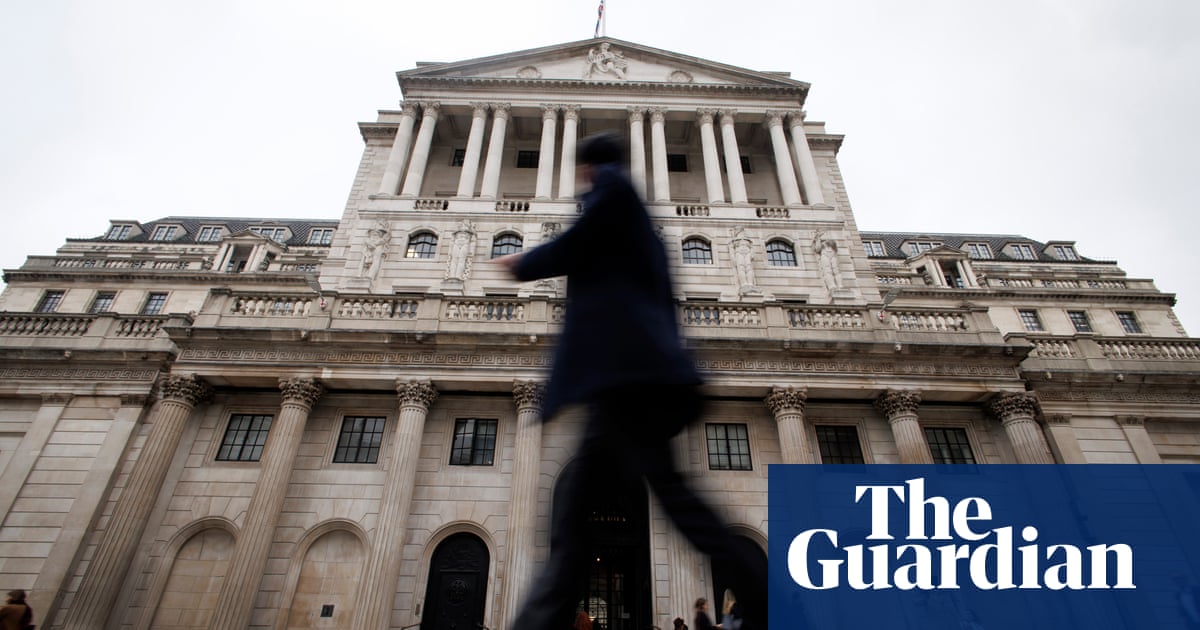Bank of England holds interest rate at 4.75% but warns of UK stagnation risk

The Bank of England has kept UK interest rates on hold but warned Britain’s economy is on the brink of stagnation after Rachel Reeves’s budget as the world economy faces stubbornly high inflation and the risk of Donald Trump reigniting global trade wars.
Keeping interest rates at 4.75% in a widely expected decision, the central bank’s monetary policy committee (MPC) said on Thursday it had slashed its forecasts for the final three months of the year with a prediction of zero economic growth. The Bank had predicted growth of 0.3% as recently as November.
Highlighting the chancellor’s £40bn tax-raising budget, alongside rising geopolitical tensions and trade policy uncertainty after Trump’s November election victory, the MPC said growth was faltering while inflation risks remained.
“These developments have generated additional uncertainties around the economic outlook,” it added.
Exposing a split at the heart of the central bank, the MPC voted by a majority of six to three to keep interest rates unchanged. Three members of the nine-strong panel – the deputy governor, Dave Ramsden, and the external economists Swati Dhingra and Alan Taylor – preferred an immediate 0.25 point reduction in borrowing costs amid concerns over the worsening growth outlook.
However, the majority of the committee said there were dangers of inflation becoming entrenched at elevated levels after figures this week showed the headline rate rose further above the Bank’s 2% target to hit 2.6% in November.
Andrew Bailey, the Bank’s governor, signalled that Threadneedle Street remained ready to cut interest rates in future but sounded a note of caution over the economic outlook. “We think a gradual approach to future interest rate cuts remains right, but with the heightened uncertainty in the economy we can’t commit to when or by how much we will cut rates in the coming year,” he said.
The US Federal Reserve cut interest rates on Wednesday by a quarter of a percentage point to a range of between 4.25% and 4.5% but suggested it would make fewer rate cuts than expected in 2025, sparking a sell-off in financial markets.
The Bank of England has signalled that UK borrowing costs are likely to be reduced further. The Bank has said it is monitoring how companies respond to Reeves’s budget amid warnings that tax increases and the rise in the minimum wage could stoke inflation.
However, activity in Britain’s economy has weakened in recent months, with output shrinking unexpectedly by 0.1% in October. Companies shedding jobs could add to slack in the labour market, where data this week indicated businesses were cutting staff at fastest rate since 2021, fuelling calls for a return to a rate-cutting cycle.
Related
Why investing in women is a vital next step for…
Get Nadine White's Race Report newsletter for a fresh perspective on the week's newsGet our free newsletter from The Independent's Race CorrespondentGet our fre
Business secretary signals major shift on electric car policy to…
In a determined effort to retain Nissan’s manufacturing presence in Britain, Business Secretary Jonathan Reynolds has vowed to implement “substantial c
Joint Statement: Business Secretary and Fujitsu Services Ltd
Business and Trade Secretary Jonathan Reynolds today (Friday 7 March) met chiefs for Fujitsu in Tokyo to begin talks over the cost of redress for victims of th
UK foreign secretary backs multilateral defence funding for Europe
UK foreign secretary David Lammy has said that a new multilateral fund will be needed to secure Europe’s defence as he confirmed that Britain is “open to”













